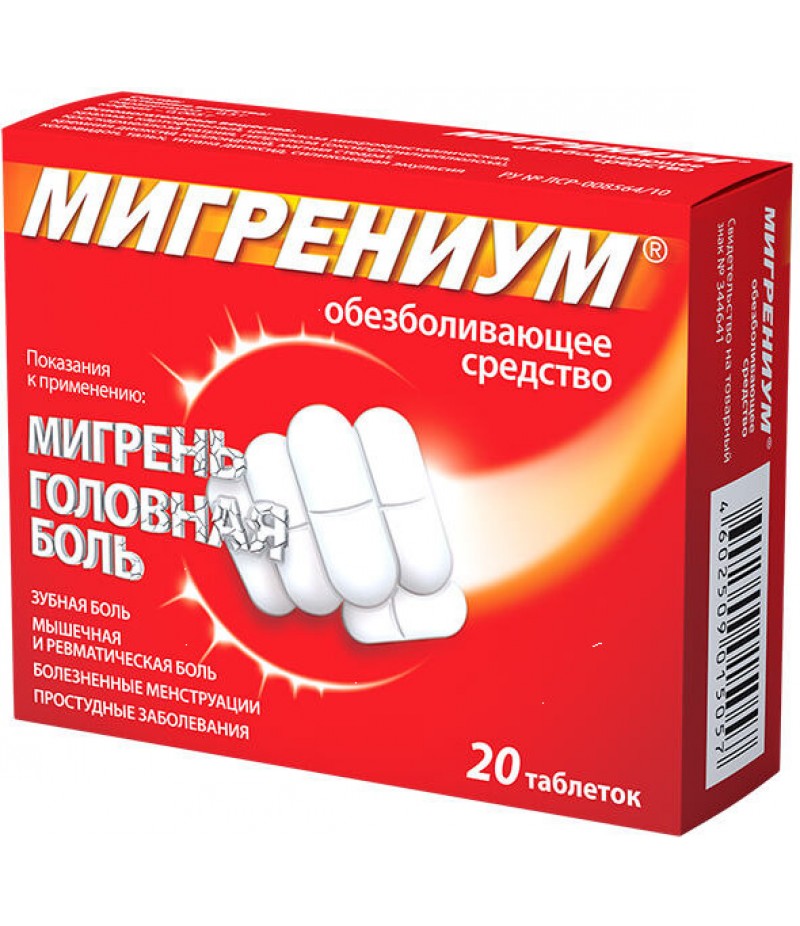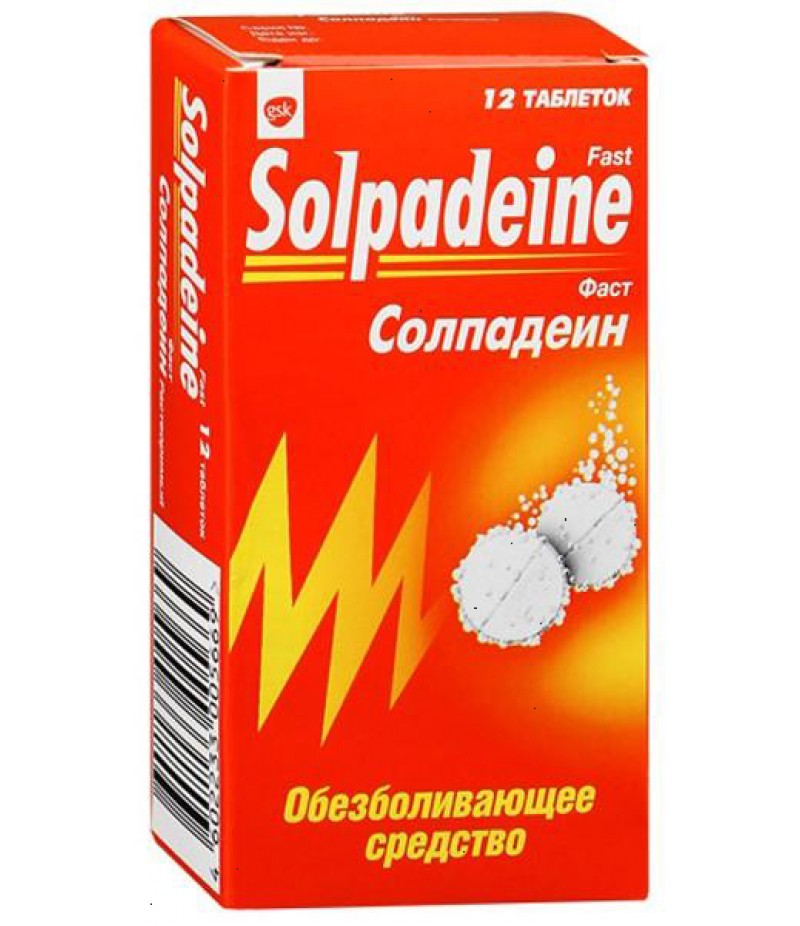Migrenium tabs 65mg + 500mg #20
- $7.20
- 3 or more $6.99
- Availability:In Stock
Migrenium instruction for useTo buy Migrenium online just add it to your shopping cartComposition active substances: paracetamol - 0,500 g, caffeine - 0,065 g. auxiliary substances: potato starc..
Tags: tabs
Migrenium instruction for use
To buy Migrenium online just add it to your shopping cart
Composition
active substances: paracetamol - 0,500 g, caffeine - 0,065 g.
auxiliary substances: potato starch, microcrystalline cellulose, croscarmellose sodium, giprolose (hydroxypropyl cellulose), silicon dioxide colloid, magnesium stearate, copovidone, talc, titanium dioxide, silicone emulsion (50% solution)
Packaging
In the package 10 and 20 pcs.
pharmachologic effect of Migrenium
Migrenium is a combined drug, the action of which is determined by the components that make up its composition.
Caffeine exerts a psychostimulant (stimulates the psychomotor centers of the brain), an analeptic effect, enhances the effect of analgesics, eliminates drowsiness and fatigue, increases physical and mental performance. Affects the cardiovascular system: increases the frequency and strength of the heart rate (heart rate), increases blood pressure (BP) with hypotension (does not change the normal). Expands the bronchi, bile ducts, blood vessels of skeletal muscles, heart, kidneys, narrows the vessels of the abdominal cavity organs. Reduces the aggregation of platelets. Stimulates the secretion of the glands of the stomach, increases basal metabolism, has a moderate diuretic effect.
Paracetamol - antipyretic and analgesic effect (due to inhibition of cyclooxygenase (COX) and inhibition of the synthesis of prostaglandins (Pg) affects the center of thermoregulation in the hypothalamus and pain impulses in the central nervous system (CNS) .The drug blocks cyclooxygenase I and II predominantly in the central nervous system, acting on the centers of pain and thermoregulation.In inflamed tissues, cellular peroxidases neutralize the effect of paracetamol on cyclooxygenase, which explains the almost complete absence of anti-inflammatory e . Defects drug has no adverse effect on the water-salt exchange (sodium and water retention) and the mucous of the gastrointestinal tract (GIT) due to lack of effect on prostaglandin synthesis in peripheral tissues possibility of formation of methemoglobin -. Unlikely.
Pharmacokinetics
Caffeine and its water-soluble salts are well absorbed in the intestine (including fat). The half-life of the drug (T1 / 2) is about 5 hours, in some individuals - up to 10 hours. The main part is demethylated and oxidized. About 10% is excreted by the kidneys unchanged.
Paracetamol is rapidly and almost completely absorbed from the digestive tract. The concentration in the plasma reaches a peak after 30-60 minutes. T1 / 2 plasma-1-4 hours Metabolised in the liver. It is excreted in the urine, mainly in the form of esters with glucuronic and sulfuric acids; Less than 5% is displayed unchanged
Migrenium, indications for use
Pain syndrome (mild and moderate): headache, migraine, ossalgia, myalgia, neuralgia, arthralgia, algodismenorea, toothache; febrile syndrome, "catarrhal" diseases, ARVI (including influenza)
Contraindications
Hypersensitivity, severe hepatic and / or renal failure, epilepsy, deficiency of glucose-6-phosphate dehydrogenase, old age, children's age (up to 12 years)
Dosing and Administration
Inside, adults and children after 12 years - 2 tablets 4 times a day with an interval of at least 4 hours. The maximum daily dose - 8 tablets.
Duration of use - no more than 3 days (as an antipyretic) and no more than 5 days (as analgesic).
Side effects
Allergic reactions (skin rash, angioedema, urticaria), dyspeptic disorders (including nausea, epigastric pain). In rare cases - hemolytic anemia, thrombocytopenia, methemoglobinemia. With prolonged use in large doses - hepatotoxicity, pancytopenia, nephrotoxicity (renal colic, pyuria, interstitial nephritis, papillary necrosis)
special instructions for Migrenium
Excessive consumption of caffeinated products (coffee, tea) on the background of treatment can cause symptoms of an overdose.
With prolonged (more than 1 week) treatment, monitoring of the peripheral blood picture and the functional state of the liver is necessary.
Without consulting a doctor take no more than 3 days in the treatment of febrile syndrome and no more than 5 days - with pain.
Can change the results of tests of doping control athletes. It is difficult to establish a diagnosis with an acute "acute abdomen." In patients with atopic bronchial asthma, pollinosis, there is an increased risk of allergic reactions. During treatment should be abandoned the use of ethanol (increased risk of hepatotoxicity)
Drug Interactions
Enhances the effect of monoamine oxidase inhibitors (MAO). Reduces the effectiveness of uricosuric medicines.
Caffeine accelerates the absorption of ergotamine.
Under the influence of paracetamol, the time of chloramphenicol elimination is increased by 5 times. With prolonged use, paracetamol can enhance the effect of anticoagulants (dicumarin derivatives). Simultaneous reception of paracetamol and ethanol increases the risk of hepatotoxic effects and acute pancreatitis. Barbiturates, phenytoin, ethanol, rifampicin, phenylbutazone, tricyclic antidepressants and other stimulators of microsomal oxidation, increase the production of hydroxylated active metabolites, causing the possibility of the development of severe intoxication with small overdoses. Inhibitors of microsomal oxidation (cimetidine) reduce the risk of hepatotoxic effects. Metoclopramide and domperidone are increased, and colestyramine reduces absorption.
Overdose
Symptoms: pallor of the skin, decreased appetite, nausea, vomiting, sometimes with blood; gepatonekroz (necrosis severity due to intoxication is directly dependent on the extent of overdose), gastralgia, agitation, anxiety, agitation, restlessness, confusion, delirium, dehydration, tachycardia, arrhythmia, hyperthermia, frequent urination, headache, tactile or pain sensitivity, tremors or muscle twitching; ringing in the ears, seizures (in acute overdose - tonic-clonic seizures), increased activity of "liver" transaminases, increase in prothrombin time; a detailed clinical picture of liver damage manifests itself after 1-6 days.
Treatment:. Donators administering to SH-groups and precursors of glutathione synthesis - methionine through 8-9chasov after the overdose and N-acetylcysteine - 12 hours to prevent late hepatotoxic action performed gastric lavage.
Storage conditions
In a dry, protected from light place at a temperature of no higher than 25 ° C. In a place inaccessible to children.
Shelf life - 3 years.
Terms of sell
To buy Migrenium you don't need a prescription.


